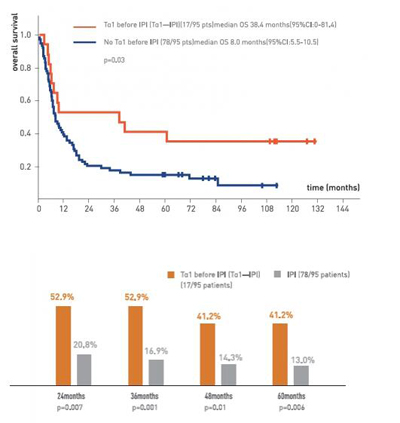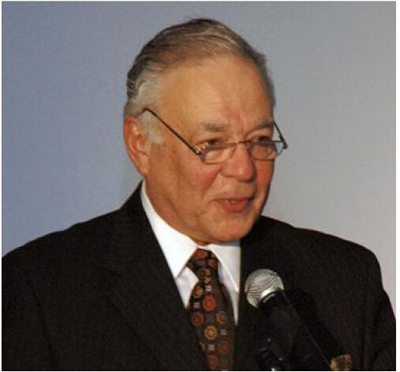胸腺肽α-1(Tα1)是一種經(jīng)典的免疫治療藥物,,可以增強先天性和適應(yīng)性免疫反應(yīng)?;谝酝芯?,達卡巴嗪(DTIC)和Tα1聯(lián)合治療能夠使患者進一步獲得生存期的延長和更長時間的疾病穩(wěn)定期。那么,,在已經(jīng)獲得長期生存的轉(zhuǎn)移性黑色素瘤(MM)患者中,,Tα1治療后序貫接受抗細胞毒性T淋巴細胞抗原-4(CTLA-4)藥物治療是否仍具有潛在的協(xié)同作用?日前,,《Expert Opinion on Biological Therapy》雜志上發(fā)表了意大利Sienna醫(yī)學(xué)院免疫與腫瘤中心Riccardo Danielli教授團隊的相關(guān)研究結(jié)果,。
對于該項研究結(jié)果,喬治華盛頓大學(xué)醫(yī)學(xué)院生物化學(xué)與分子醫(yī)學(xué)系A(chǔ)llan L. Goldstein教授進行了精彩點評,。
研究簡介背景
免疫檢查點抑制劑(imAbs),,如以ipilimumab(IPI)為代表的細胞毒性T淋巴細胞抗原-4(CTLA-4)能夠提高轉(zhuǎn)移性黑色素瘤(MM)的總生存期(OS)。長期隨訪下的OS逐漸成為MM的終點事件,。一項轉(zhuǎn)移性黑色素瘤II期臨床研究及一項EAP項目中,,Tα1聯(lián)合DTIC顯示出抗腫瘤效果。本研究回顧分析了使用Tα1治療MM患者的長期隨訪數(shù)據(jù),,以明確在接受imAbs治療的患者中Tα1所起到的作用,。
方法?
對Ⅱ期臨床試驗(試驗號:NCT00911443)和EAP項目中使用Tα1治療的黑色素瘤患者數(shù)據(jù)收集后,分析Tα1治療后序貫接受抗CTLA-4藥物治療患者的中位OS,。此外,,研究還探索了Tα1治療后序貫IPI治療對長期生存患者的影響。
結(jié)果
在使用Tα1治療的61例患者中?,,21例患者序貫接受抗CTLA-4治療,。結(jié)果顯示,序貫接受抗CTLA-4治療的中位OS 57.8個月,,未序貫接受CTLA-4治療的中位OS 7.4個月,。對于所有95例接受IPI治療的患者,使用Tα1進行預(yù)處理能夠顯著延長患者長期OS(38.4個月對8.0個月,,P=0.03),,患者的2年、3年,、4年,、5年生存率均顯著升高(圖),。
結(jié)論
這是關(guān)于Tα1治療患者長期隨訪的首份報告。該研究表明患者使用Tα1和IPI的序貫治療,,能夠獲得OS的顯著延長,,該結(jié)果表明Tα1與IPI具有協(xié)同作用。
Abstract
Background
Immune checkpoint blockade antibodies (imAbs), such as the anti Cytotoxic T Lymphocyte Antigen-4 (CTLA-4) ipilimumab (IPI) raised overall survival (OS) in metastatic melanoma (MM). Further, long-term OS is a crucial endpoint in MM. Thymosin alpha-1 (Tα1) with dacarbazine (DTIC) showed activity in a phase II trial and a compassionate use program (EAP). We report on long-term follow-up of patients treated with Tα1 to investigate the preconditioning role of Tα1 in imAbs-treated patients.
Methods
Records of patients with melanoma treated with Tα1 within a phase II trial and EAP program were reviewed comparing median OS among patients that sequentially received anti-CTLA-4 imAb and Tα1. Further, the effect of Tα1 on IPI long-term survivor patients was investigated.
Results
Among patients treated with Tα1, 21/61 patients received sequentially even anti CTLA-4 imAbs. Median OS at the data cut-off was 57.8 and 7.4 months in patients treated sequentially with anti-CTLA-4 imAbs or not, respectively. Moreover, pretreatment with Tα1 in all (95) IPI-evaluable patients confirmed a significant increase in long-term OS.
Conclusion
This is the first report on long-term follow-up of Tα1-treated patients. Moreover, an advantage in OS in patients sequentially treated with Tα1 and IPI was seen that suggests a synergistic effect.
Allan L. Goldstein教授點評
來自意大利Sienna醫(yī)學(xué)院免疫與腫瘤中心的Riccardo教授及研究團隊首次研究并報道Tα1聯(lián)合IPI治療MM患者,,能夠產(chǎn)生協(xié)同作用提高療效,,顯著提高患者的OS(Expert Opinion on Biological Therapy 2018, Vol 18, No. s1, 77-83)。
近年來,,imAbs在腫瘤治療中發(fā)展迅猛,。IPI等imAbs專門作用于CTLA-4——一種位于T細胞上的蛋白質(zhì),如同一種“關(guān)閉開關(guān)”,,可以防止T細胞特異性攻擊癌細胞,。有研究表明,IPI及其他imAbs有助于延長晚期黑色素瘤,、肺癌,、腎癌及膀胱癌患者的生存期。
本研究進一步顯示,,除已經(jīng)被證實的可激活化療,、放療和手術(shù)后腫瘤患者的先天性免疫和適應(yīng)性免疫反應(yīng)外,Tα1還可協(xié)同IPI進一步延長患者的生存期,。該研究還發(fā)現(xiàn),,隨訪95例接受IPI治療的患者,,曾經(jīng)接受Tα1治療的患者其3年,、4年和5年生存期相較未曾接受Tα1治療的患者顯著增加。
作者還建議,,評估Tα1-IPI協(xié)同作用的最好方法是在晚期黑色素瘤患者中觀察患者的“長期總體生存終點”,。但很遺憾,該研究采用了回顧性數(shù)據(jù)分析,,期待針對該研究結(jié)果開展前瞻性Ⅲ/Ⅳ期黑色素瘤患者采用Tα1-IPI序貫治療的研究以進一步證實其療效,。如果該研究結(jié)果被證實,將極大提升Tα1聯(lián)合IPI,,甚至整個imAbs家族的信心,。
Allan L. Goldstein
Dr. Goldstein is Emeritus Professor in the Department of Biochemistry and Molecular Medicine at The George Washington University School of Medicine in Washington, DC. He Chaired the Department from 1978 until March 2009. He is an authority on the thymus gland and the workings of the immune system, and co-discoverer (with Abraham White) of the Thymosins, a family of hormone-like peptides isolated from the thymus gland. Thymosina1(TA1) a molecule with immune enhancing properties, was the first of the Thymosins to enter clinical trials. It has been approved in China and 35 other countries, and has shown great promise in the treatment of severe sepsis, cancer, and a number of other diseases including the potential treatment of cystic fibrosis. Most recentlyTA1 has been found to synergize with Ipilimumab(IPI) ,a check-point inhibitor & further extend the survival of Stage III/IV melanoma patients previously treated successfully with TA1 melanoma patients Thymosinβ4 (Tβ4), the second of the Thymosins to reach the clinic, has been shown to accelerate wound healing and the remodeling of injured tissues. Early Phase-II trials have been completed in patients with pressure and venostasis ulcers. Two Phase-III trials in with dry eye and neurotrophic keratopathy have been completed in the US with promising results. A new Phase 3 trial in dry eye with 700 patients will begin in the fourth quarter of 2018An injectable form of Tb4 has been developed for internal indications such as myocardial infarction, stroke, multiple sclerosis, brain trauma and peripheral neuropathy. Dr. Goldstein’s research has helped define the role of biological response modifiers in health and disease, and has led to the discovery of important new links between the immune system, the neuroendocrine system and the brain.
He received his B.S. degree from Wagner College in 1959 and his M.S. and Ph.D. degrees from Rutgers University in 1964. He served on the faculties of the Albert Einstein College of Medicine from 1964 to 1972, and The University of Texas Medical Branch in Galveston from 1972 through 1978. Dr. Goldstein was the co-founder and first President and Scientific Director of The Institute for Advanced Studies in Aging and Geriatric Medicine (IASIA). He has also served as a member of the Board of Trustees of the Albert Sabin Vaccine Institute, as well as the Board of Directors of The George Washington University Cardiovascular Institute. He currently serves as the Chairman of the Board and Chief Scientific Advisor for RegeneRx Biopharmaceuticals, a public company developing novel wound healing and remodeling therapeutics.
Dr. Goldstein is the author of more than 445 scientific articles in professional journals, the inventor on over 25 U.S. and overseas patents, and the editor of several books in the fields of biochemistry, biomedicine, immunology and neuroscience. He is the recipient of several awards including the Career Scientist Award of the Health Research Council, City of New York; the Van Dyke Memorial Award in Pharmacology from the College of Physicians and Surgeons of Columbia University, a citation from the U.S. Department of Health, Education and Welfare “in recognition and appreciation of outstanding work in helping to establish a national program of ‘Biological Response Modifiers’”; a Doctor of Science Degree (Honoris Causa), Wagner College; the Decoration of the Order “Vasco Nunez De Balboa,” in the rank of Commander, Panama’s highest national honor for “contributions directed to the preservation of human life in the world”; the Distinguished Researcher Award of The George Washington University School of Medicine, and the “Chevalier des PalmesAcademiques,” for his scientific contributions to France.
Over the years, Dr. Goldstein’s laboratory has been a center for the training of graduate, medical, and postdoctoral students, many of whom are now continuing and expanding his studies on the role of the thymus in health and disease. Dr. Goldstein has also been a pioneer in medical education having developed a unique series of distance education programs presented for the Internet, called “Frontiers in Medicine.” This series of lectures and National Town Forums by leading scientists focused on research at the cutting edge. The broadcasts, which were presented “live” from The George Washington University, began in 1997 and were a first for continuing medical education on the Internet.
對于該項研究結(jié)果,喬治華盛頓大學(xué)醫(yī)學(xué)院生物化學(xué)與分子醫(yī)學(xué)系A(chǔ)llan L. Goldstein教授進行了精彩點評,。
研究簡介背景
免疫檢查點抑制劑(imAbs),,如以ipilimumab(IPI)為代表的細胞毒性T淋巴細胞抗原-4(CTLA-4)能夠提高轉(zhuǎn)移性黑色素瘤(MM)的總生存期(OS)。長期隨訪下的OS逐漸成為MM的終點事件,。一項轉(zhuǎn)移性黑色素瘤II期臨床研究及一項EAP項目中,,Tα1聯(lián)合DTIC顯示出抗腫瘤效果。本研究回顧分析了使用Tα1治療MM患者的長期隨訪數(shù)據(jù),,以明確在接受imAbs治療的患者中Tα1所起到的作用,。
方法?
對Ⅱ期臨床試驗(試驗號:NCT00911443)和EAP項目中使用Tα1治療的黑色素瘤患者數(shù)據(jù)收集后,分析Tα1治療后序貫接受抗CTLA-4藥物治療患者的中位OS,。此外,,研究還探索了Tα1治療后序貫IPI治療對長期生存患者的影響。
結(jié)果
在使用Tα1治療的61例患者中?,,21例患者序貫接受抗CTLA-4治療,。結(jié)果顯示,序貫接受抗CTLA-4治療的中位OS 57.8個月,,未序貫接受CTLA-4治療的中位OS 7.4個月,。對于所有95例接受IPI治療的患者,使用Tα1進行預(yù)處理能夠顯著延長患者長期OS(38.4個月對8.0個月,,P=0.03),,患者的2年、3年,、4年,、5年生存率均顯著升高(圖),。

結(jié)論
這是關(guān)于Tα1治療患者長期隨訪的首份報告。該研究表明患者使用Tα1和IPI的序貫治療,,能夠獲得OS的顯著延長,,該結(jié)果表明Tα1與IPI具有協(xié)同作用。
Abstract
Background
Immune checkpoint blockade antibodies (imAbs), such as the anti Cytotoxic T Lymphocyte Antigen-4 (CTLA-4) ipilimumab (IPI) raised overall survival (OS) in metastatic melanoma (MM). Further, long-term OS is a crucial endpoint in MM. Thymosin alpha-1 (Tα1) with dacarbazine (DTIC) showed activity in a phase II trial and a compassionate use program (EAP). We report on long-term follow-up of patients treated with Tα1 to investigate the preconditioning role of Tα1 in imAbs-treated patients.
Methods
Records of patients with melanoma treated with Tα1 within a phase II trial and EAP program were reviewed comparing median OS among patients that sequentially received anti-CTLA-4 imAb and Tα1. Further, the effect of Tα1 on IPI long-term survivor patients was investigated.
Results
Among patients treated with Tα1, 21/61 patients received sequentially even anti CTLA-4 imAbs. Median OS at the data cut-off was 57.8 and 7.4 months in patients treated sequentially with anti-CTLA-4 imAbs or not, respectively. Moreover, pretreatment with Tα1 in all (95) IPI-evaluable patients confirmed a significant increase in long-term OS.
Conclusion
This is the first report on long-term follow-up of Tα1-treated patients. Moreover, an advantage in OS in patients sequentially treated with Tα1 and IPI was seen that suggests a synergistic effect.
Allan L. Goldstein教授點評
來自意大利Sienna醫(yī)學(xué)院免疫與腫瘤中心的Riccardo教授及研究團隊首次研究并報道Tα1聯(lián)合IPI治療MM患者,,能夠產(chǎn)生協(xié)同作用提高療效,,顯著提高患者的OS(Expert Opinion on Biological Therapy 2018, Vol 18, No. s1, 77-83)。
近年來,,imAbs在腫瘤治療中發(fā)展迅猛,。IPI等imAbs專門作用于CTLA-4——一種位于T細胞上的蛋白質(zhì),如同一種“關(guān)閉開關(guān)”,,可以防止T細胞特異性攻擊癌細胞,。有研究表明,IPI及其他imAbs有助于延長晚期黑色素瘤,、肺癌,、腎癌及膀胱癌患者的生存期。
本研究進一步顯示,,除已經(jīng)被證實的可激活化療,、放療和手術(shù)后腫瘤患者的先天性免疫和適應(yīng)性免疫反應(yīng)外,Tα1還可協(xié)同IPI進一步延長患者的生存期,。該研究還發(fā)現(xiàn),,隨訪95例接受IPI治療的患者,,曾經(jīng)接受Tα1治療的患者其3年,、4年和5年生存期相較未曾接受Tα1治療的患者顯著增加。
作者還建議,,評估Tα1-IPI協(xié)同作用的最好方法是在晚期黑色素瘤患者中觀察患者的“長期總體生存終點”,。但很遺憾,該研究采用了回顧性數(shù)據(jù)分析,,期待針對該研究結(jié)果開展前瞻性Ⅲ/Ⅳ期黑色素瘤患者采用Tα1-IPI序貫治療的研究以進一步證實其療效,。如果該研究結(jié)果被證實,將極大提升Tα1聯(lián)合IPI,,甚至整個imAbs家族的信心,。
Allan L. Goldstein

Dr. Goldstein is Emeritus Professor in the Department of Biochemistry and Molecular Medicine at The George Washington University School of Medicine in Washington, DC. He Chaired the Department from 1978 until March 2009. He is an authority on the thymus gland and the workings of the immune system, and co-discoverer (with Abraham White) of the Thymosins, a family of hormone-like peptides isolated from the thymus gland. Thymosina1(TA1) a molecule with immune enhancing properties, was the first of the Thymosins to enter clinical trials. It has been approved in China and 35 other countries, and has shown great promise in the treatment of severe sepsis, cancer, and a number of other diseases including the potential treatment of cystic fibrosis. Most recentlyTA1 has been found to synergize with Ipilimumab(IPI) ,a check-point inhibitor & further extend the survival of Stage III/IV melanoma patients previously treated successfully with TA1 melanoma patients Thymosinβ4 (Tβ4), the second of the Thymosins to reach the clinic, has been shown to accelerate wound healing and the remodeling of injured tissues. Early Phase-II trials have been completed in patients with pressure and venostasis ulcers. Two Phase-III trials in with dry eye and neurotrophic keratopathy have been completed in the US with promising results. A new Phase 3 trial in dry eye with 700 patients will begin in the fourth quarter of 2018An injectable form of Tb4 has been developed for internal indications such as myocardial infarction, stroke, multiple sclerosis, brain trauma and peripheral neuropathy. Dr. Goldstein’s research has helped define the role of biological response modifiers in health and disease, and has led to the discovery of important new links between the immune system, the neuroendocrine system and the brain.
He received his B.S. degree from Wagner College in 1959 and his M.S. and Ph.D. degrees from Rutgers University in 1964. He served on the faculties of the Albert Einstein College of Medicine from 1964 to 1972, and The University of Texas Medical Branch in Galveston from 1972 through 1978. Dr. Goldstein was the co-founder and first President and Scientific Director of The Institute for Advanced Studies in Aging and Geriatric Medicine (IASIA). He has also served as a member of the Board of Trustees of the Albert Sabin Vaccine Institute, as well as the Board of Directors of The George Washington University Cardiovascular Institute. He currently serves as the Chairman of the Board and Chief Scientific Advisor for RegeneRx Biopharmaceuticals, a public company developing novel wound healing and remodeling therapeutics.
Dr. Goldstein is the author of more than 445 scientific articles in professional journals, the inventor on over 25 U.S. and overseas patents, and the editor of several books in the fields of biochemistry, biomedicine, immunology and neuroscience. He is the recipient of several awards including the Career Scientist Award of the Health Research Council, City of New York; the Van Dyke Memorial Award in Pharmacology from the College of Physicians and Surgeons of Columbia University, a citation from the U.S. Department of Health, Education and Welfare “in recognition and appreciation of outstanding work in helping to establish a national program of ‘Biological Response Modifiers’”; a Doctor of Science Degree (Honoris Causa), Wagner College; the Decoration of the Order “Vasco Nunez De Balboa,” in the rank of Commander, Panama’s highest national honor for “contributions directed to the preservation of human life in the world”; the Distinguished Researcher Award of The George Washington University School of Medicine, and the “Chevalier des PalmesAcademiques,” for his scientific contributions to France.
Over the years, Dr. Goldstein’s laboratory has been a center for the training of graduate, medical, and postdoctoral students, many of whom are now continuing and expanding his studies on the role of the thymus in health and disease. Dr. Goldstein has also been a pioneer in medical education having developed a unique series of distance education programs presented for the Internet, called “Frontiers in Medicine.” This series of lectures and National Town Forums by leading scientists focused on research at the cutting edge. The broadcasts, which were presented “live” from The George Washington University, began in 1997 and were a first for continuing medical education on the Internet.
當前頁面地址:http://www.zgysw.net/news/6266.html



